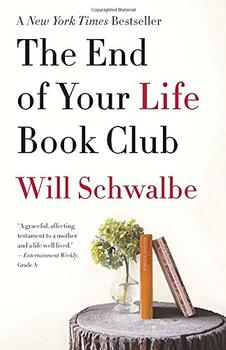Summary | Excerpt | Reading Guide | Discuss | Reviews | Beyond the Book | Readalikes | Genres & Themes | Author Bio

"Do you think he'll be all right?" I would ask her, referring to Sid, who is very much alone at the end.
"Of course it'll be tough on him, but I think he'll be fine. I'm quite sure of it. Maybe not right away. But he'll be fine," she would answer, also referring to Sid but perhaps to my father as well.
Books had always been a way for my mother and me to introduce and explore topics that concerned us but made us uneasy, and they had also always given us something to talk about when we were stressed or anxious. In the months since her diagnosis, we'd started talking more and more about books. But it was with Crossing to Safety that we both began to realize that our discussions were more than casual - that we had created, without knowing it, a very unusual book club, one with only two members. As in many book clubs, our conversations bounced around between the characters' lives and our own. Sometimes we discussed a book in depth; other times we found ourselves in a conversation that had little to do with the book or the author who had sparked it.
I wanted to learn more about my mother's life and the choices she'd made, so I often steered the conversation there. She had an agenda of her own, as she almost always did. It took me some time, and some help, to figure it out.
Over the course of Mom's illness, before and after Crossing to Safety, Mom and I read dozens of books of all different kinds. We didn't read only "great books," we read casually and promiscuously and whimsically. (As I said, my mother was thrifty; if you gave her a book, she would read it.) We didn't always read the same books at the same time; nor did we meet over meals, nor on specific days, nor a set number of times per month. But we were forced to keep coming back to that waiting room as Mom's health got worse and worse. And we talked about books just as often as we talked about anything.
My mother was a fast reader. Oh, and one other thing I should mention. She always read the end of a book first because she couldn't wait to find out how things would turn out. I realized, when I started writing this book, that, in a way, she'd already read the end of it - when you have pancreatic cancer that's diagnosed after it's spread, there isn't likely to be a surprise ending. You can be fairly certain of what fate has in store.
You could say that the book club became our life, but it would be more accurate to say that our life became a book club. Maybe it had always been one - and it took Mom's illness to make us realize that. We didn't talk much about the club. We talked about the books, and we talked about our lives.
We all have a lot more to read than we can read and a lot more to do than we can do. Still, one of the things I learned from Mom is this: Reading isn't the opposite of doing; it's the opposite of dying. I will never be able to read my mother's favorite books without thinking of her - and when I pass them on and recommend them, I'll know that some of what made her goes with them; that some of my mother will live on in those readers, readers who may be inspired to love the way she loved and do their own version of what she did in the world.
But I've gotten ahead of myself. Let me go back to the beginning, or rather the beginning of the end, to before Mom's diagnosis, when she started to get sick and we didn't know why.
Appointment in Samarra
Mom and I loved opening lines of novels."The small boys came early to the hanging" was one of our favorites, from Ken Follett's The Pillars of the Earth. How could you not go on reading? And the first sentence of John Irving's A Prayer for Owen Meany: "I am doomed to remember a boy with a wrecked voice - not because of his voice, or because he was the smallest person I ever knew, or even because he was the instrument of my mother's death, but because he is the reason I believe in God; I am a Christian because of Owen Meany." And E. M. Forster's first line in Howard's End: "One may as well begin with Helen's letters to her sister." It's the "may as well" that draws you in - casual, chatty even, yet it gives the reader a strong sense that there's a lot of story to come.
Excerpted from The End of Your Life Book Club by Will Schwalbe. Copyright © 2012 by Will Schwalbe. Excerpted by permission of Knopf. All rights reserved. No part of this excerpt may be reproduced or reprinted without permission in writing from the publisher.
Your guide toexceptional books
BookBrowse seeks out and recommends the best in contemporary fiction and nonfiction—books that not only engage and entertain but also deepen our understanding of ourselves and the world around us.